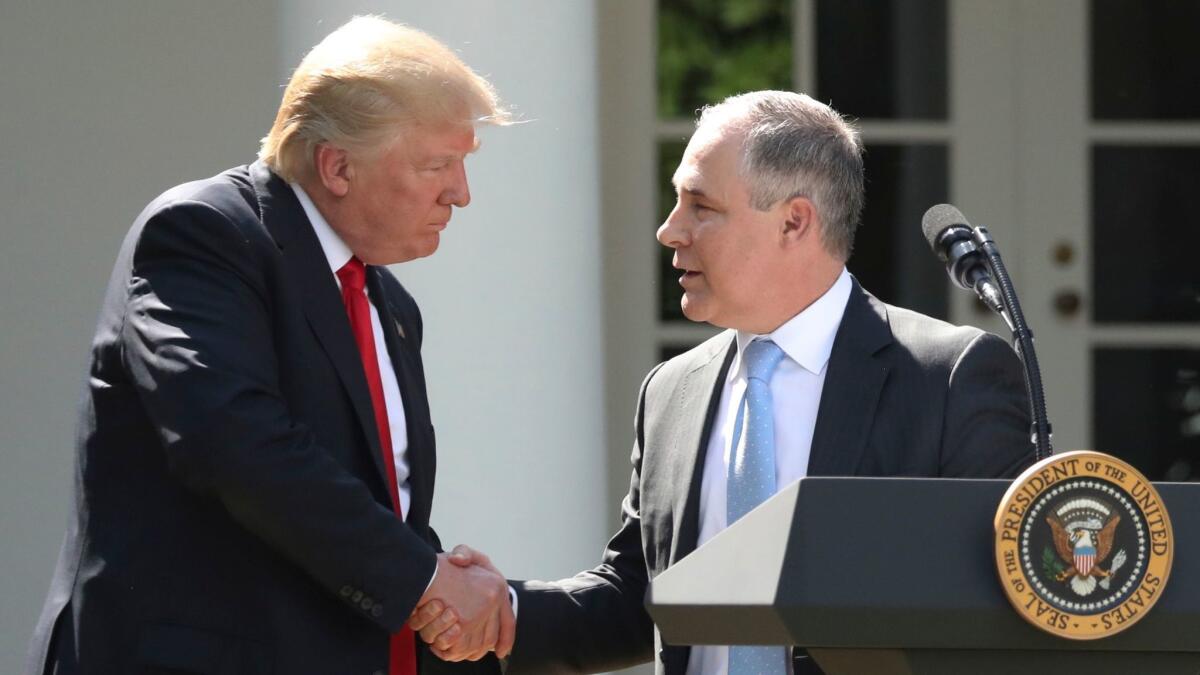Editorial: How President Trump and the EPA’s Scott Pruitt are making America’s environment deadly again

- Share via
When Donald Trump ran for president, one pledge he made repeatedly was to reduce regulations and limit the hurdles businesses face when trying to build, expand or operate — including when they affect the environment. You know, pollute. And there is a legitimate argument to be made that outdated, ineffective or counterproductive regulations should be amended or withdrawn; that’s why every presidential candidate promises to do just that. But there is absolutely no persuasive argument to be made that the federal government should ignore its responsibility to enforce environmental regulations.
But that appears to be just what is happening under Environmental Protection Agency director Scott Pruitt, whose coziness with the oil-and-gas industry makes him among the least-appropriate people in the country to ensure the right balance is struck between promoting economic and industrial activity and preserving the environment. Pruitt stepped into the national political spotlight when, as attorney general for Oklahoma, he sued the EPA at least 14 times. Now he’s in charge of it, and he has moved aggressively to undo or dismantle core aspects of EPA enforcement. In fact, the Environmental Integrity Project reports that the Trump administration collected 60% less in civil penalties from polluters through July 31 than any of the previous three administrations collected over a similar time frame. Pruitt has filed only 26 civil actions to resolve violations, 30% fewer than the three previous administrations filed on average during the same time period.
Pruitt also has targeted more than 30 rules and regulations for rescission or rollback, and, according to the Public Employees for Environmental Responsibility advocacy group, has significantly reduced enforcement of the Clean Water Act and the Clean Air Act — which provided the “most active dockets” under previous administrators. But his aim is broad. He overruled his own staff and refused to ban chlorpyrifos, a pesticide that mounting scientific evidence suggests can affect development of the brain and nervous systems in young children. He dropped an Obama administration requirement that oil and gas drillers collect and report data on emissions. He also tried to freeze an Obama rule restricting methane emissions from new oil and gas wells, but a federal appeals court held that Pruitt couldn’t do so unilaterally and must follow federal regulatory procedures — a decision that should hearten environmentalists who hope the courts will be the firewall against the administration’s attack on environmental protections.
Trump’s proposed EPA budget would cut 31% of the agency’s funding, kill 3,200 of the agency’s 15,000 jobs, and cut $129 million from federal enforcement.
And make no mistake — this is an attack. During the campaign, Trump said: “Environmental protection, what they do is a disgrace; every week they come out with new regulations.” His proposed budget, which Pruitt endorses, would cut 31% of the agency’s funding, kill 3,200 of the agency’s 15,000 jobs, and cut $129 million from federal enforcement and an additional $482 million in aid to states to support their enforcement efforts, among other environmental programs. The Republican-led Congress told Trump it will not go along with such a devastating budget, but the spending plan still evinces how much value Trump places on environmental protection. Given the president’s abject disinterest in the nuts-and-bolts of policy, Trump’s priorities are by default set by Pruitt, a man who went to Washington planning to collapse from within an agency he had fought so hard from the outside.
And Pruitt is doing it largely out of sight. Career employees say they rarely interact with him, and when they do, note-taking is not allowed, limiting creation of government records. Policy decisions — such as they are — are made in consultation with a coterie of political appointees and industry representatives, a practice that led several Senate Democrats on Thursday to accuse Pruitt of “taking deliberate steps to thwart transparency,” including taking care not to leave a paper trail of the decision-making process. Tellingly, Pruitt moves through the EPA offices with a bodyguard detail, a message that he sees himself as treading in enemy territory. Not surprisingly, morale is toxic and career employees are looking for the exit — which, in fact, helps speed up the agency’s decline.
While it’s true that any of the other Republican candidates for president last year likely would have targeted the EPA for some cuts, it’s hard to imagine any of them doing it with this level of aggression. Congress has yet to set federal spending levels for the next fiscal year, so it’s hard to tell what the EPA’s budget ultimately will look like. But what is clear is that even if Congress appropriates money, Pruitt won’t necessarily use it. Congress has an oversight role here, and it must ensure that Pruitt, left to his own devices, doesn’t single-handedly dismantle the nation’s strongest force for environmental protection.
Follow the Opinion section on Twitter @latimesopinion or Facebook
More to Read
A cure for the common opinion
Get thought-provoking perspectives with our weekly newsletter.
You may occasionally receive promotional content from the Los Angeles Times.









